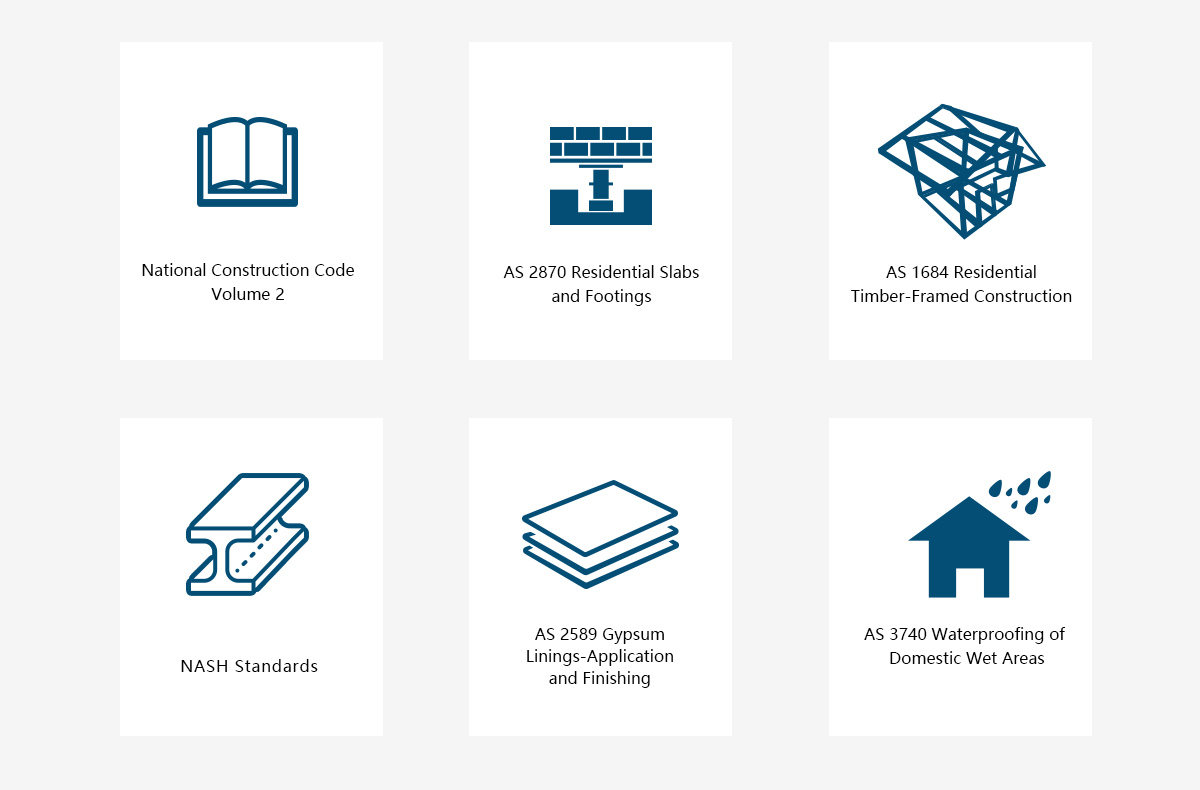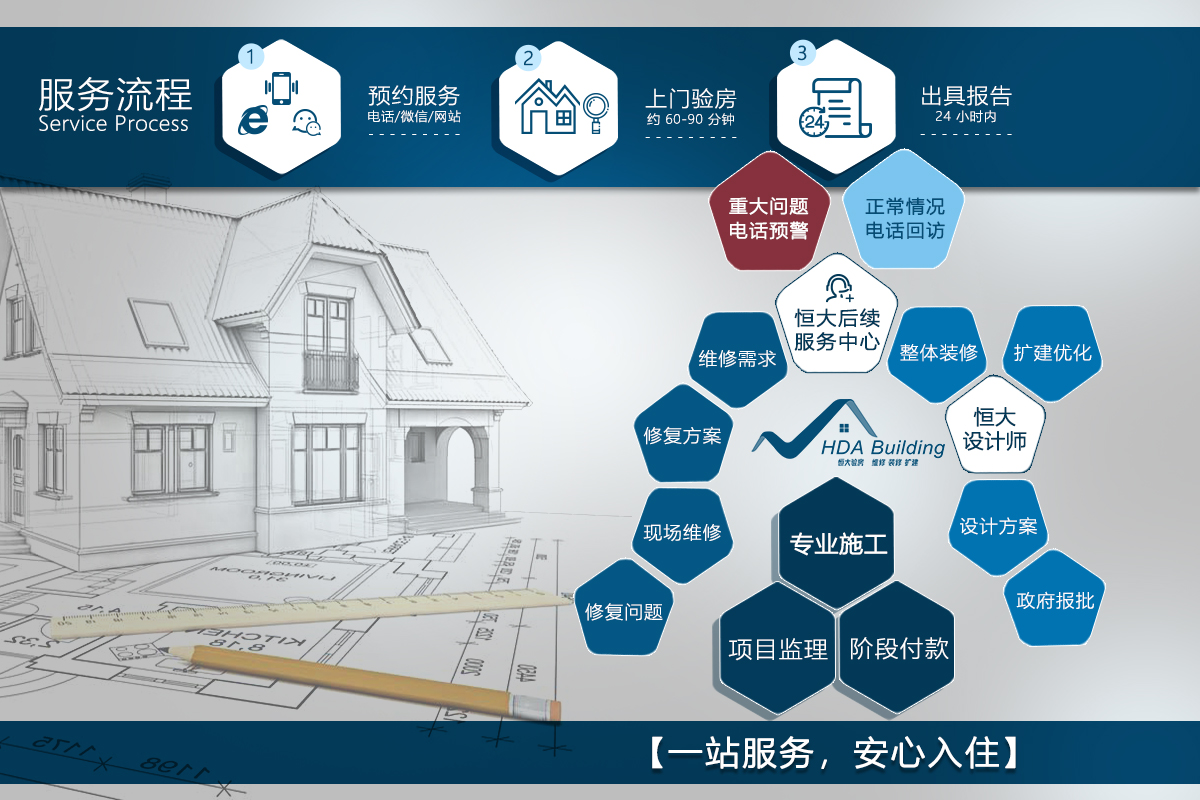
Why choose HDA Building
Australian Official Certification
VBA Official Registration
 
Registered Pest Management
 
Full Commercial Insurance
Extensive Industry Experience
Complete Civil & Commercial License
20 Years Experience in Building Inspection
Residential & Commerce Licensed
Professional Reporting System
Professional Land Risk Assessment
Professional Building Inspection Report
Professional Pest Report
Systematic Profound Solutions
Comprehensive Customer Services
Major Problem Fixes
 
One-Step Renovation

Our Services
Pre-Purchase Inspection
New Property Handover
Construction Stage
Pool Inspection
Contact us
Our System of Inspection
Our Standard of Inspection


Our Inspection Equipment
Common customers' concerns and questions
Risk AssessmentHow can risk assessment help?
The land is the core and ultimate embodiment of real estate value, and the condition of the land property will be directly reflected in the future increase of real estate. Land risk assessment before purchasing real estate will effectively reduce the purchase of stagnant real estate and other non-performing assets.
Major influences on land value are mainly the planning attributes of the land, including whether the zoning conditions of land have development potential, whether there are various kinds of overlay restricting development on the land, the impact of core building indicators such as land building coverage rate and greening rate on future planning, and the impact of objective conditions such as land status, trees, and neighbourhood relations on land. Therefore, it is very important for the architect to check the conditions of the land.
The two are complementary.
Transfer lawyers are mainly based on the control of legal risks of land, including the review of land title information, to ensure the safety and reliability of land in property rights, mortgages, and other details.
Yes, you need it!
Even if they do not have a development plan at the moment, the real estate has been regarded as the most important asset component of each family, and the land has good planning properties without various restrictions, and the land with high development potential in the future will inevitably become the leading asset in the region where the real estate is located.
It is an important means to avoid the loss of family assets to have a clear understanding of the basic conditions of the land in the early stage of buying real estate and to ensure that the purchased land has no major defects.


Risk AssessmentHow can risk assessment help?
Although the house is self-occupied, it needs to be adjusted to the changes in family structure and living habits. In the whole process of a self-occupied house, there will be various repair and reconstruction needs, such as a new fence, backyard decking, or room expansion.
In Australia, laws and regulations have very clear and detailed provisions on various conditions of the land, especially for some land parcels with SBO (special restrictions), all kinds of minor changes need to apply for permission from the local council, which will increase the cost of a lot of application fees, and there are also many uncertainties.
Therefore, understanding the restrictions of land can master the information in advance, clearly know the feasibility and difficulty of upgrading and adjustment, and can plan and layout in advance to avoid wasting costs because of the lack of understanding of the restrictions in the early stage.
Although expansion is a relatively economical way to improve living, not all projects are suitable for expansion.
The expansion will be limited by the land building coverage rate, green rate and various overlays. At the same time, the existing building types and structures should also be considered. Different building structures will lead to huge cost differences in the connecting part of the expansion.
Therefore, it is necessary to comprehensively judge whether the expansion meets the feasibility and economic value. The expansion feasibility study report will tell you whether the property can meet the requirements of the expansion, how much area space can be expanded, and whether the implementation of the expansion meets the economic value.
Under normal circumstances, we will provide a complete risk assessment report within 1-2 days after the application, which not only indicates the requirements and restrictions of various government regulations on land but also provides detailed explanations and annotations in Chinese, so that you can intuitively understand the depth of land information.
The government’s planning goals for large areas will last for a long time, but the detailed indicators of planning will be modified according to the changes in planning ideas at different times.
The land risk assessment report only analyses the current government regulations, and the government may adjust the values of some planning indicators in the future. Therefore, the report is an important reference before the current purchase of land or corresponding reconstruction.
Inspection ServiceCustomer attention to inspection details
The tests include all accessible areas of the premises, and all tests must comply with the Australian Testing Standard (AS 4349.1), including:
- Interior of the building
- Exterior of the building
- Roof space
- Sub-floor space
- Land within the red line
- Structural cracking and movement
- Moisture problem
- Pipeline leakage problem
- Roof drainage and waterproofing problems
- Failure of waterproof layer
- Corrosion problem
- Asbestos material
- Ventilation problem
- All non-standard building construction inside and outside
- Pest problem
Yes.
We welcome customers to the site, the home inspector will point out the practical problems of various types of housing, and provide very valuable advice on future home maintenance.
First of all, after the inspection, we will send a detailed inspection report within 24 hours, so that customers can
clearly understand all the details of the inspection.
At the same time, our customer service will also conduct corresponding phone visits for each project after sending the report, and provide corresponding suggestions while explaining the housing problems.


Inspection ServiceCustomer attention to inspection details
Yes, it is highly necessary to conduct a home inspection for new houses or relatively new pre-owned houses.
For new houses, during the construction and delivery process, there can be various issues and defects due to factors such as rushed work by the builder. If these problems or potential risks are not detected during the inspection before the final handover, the buyer may miss the opportunity to have the builder rectify them free of charge.
As for relatively new pre-owned houses, sellers often renovate them to enter the market. They tend to focus more on surface renovations while overlooking or concealing many hidden defects. In such cases, it becomes even more crucial to have a professional home inspector with extensive experience and specialized equipment to uncover potential issues.
When including protection clauses related to home inspections in a property purchase agreement, you can consider the following phrase: “subject to inspection without major structural defects or termite infestation.”
By incorporating this clause, it allows the buyer to conduct a thorough inspection of the property for any significant structural issues or termite problems. If any problems are discovered during the inspection, the buyer can take a proactive approach, engaging in negotiations with the seller to address the issues, potentially renegotiating the price, or even having the option to withdraw from the contract.
In Australia, once the hammer falls at an auction, the buyer generally does not have the right to back out of the purchase, even if significant issues are discovered with the property afterwards. This means that buyers have limited recourse if they find major problems with the property post-auction.
Therefore, it is strongly recommended to arrange a professional home inspection before the auction. This allows buyers to have a comprehensive understanding of the property’s condition and identify any potential issues or risks. With the information obtained from the inspection, buyers can make informed decisions about bidding at the auction, considering any necessary repairs or costs that may arise from the inspection findings.
Australian law stipulates that before the handover of pre-owned housing, the seller must provide the final acceptance of the house.
Under normal circumstances, if no inspection has been done at the time of the transaction, the inspection handover will be accompanied by HDA inspector, who can have the most comprehensive understanding of all the details of the house and give perfect repair suggestions and plans for the problems found.







